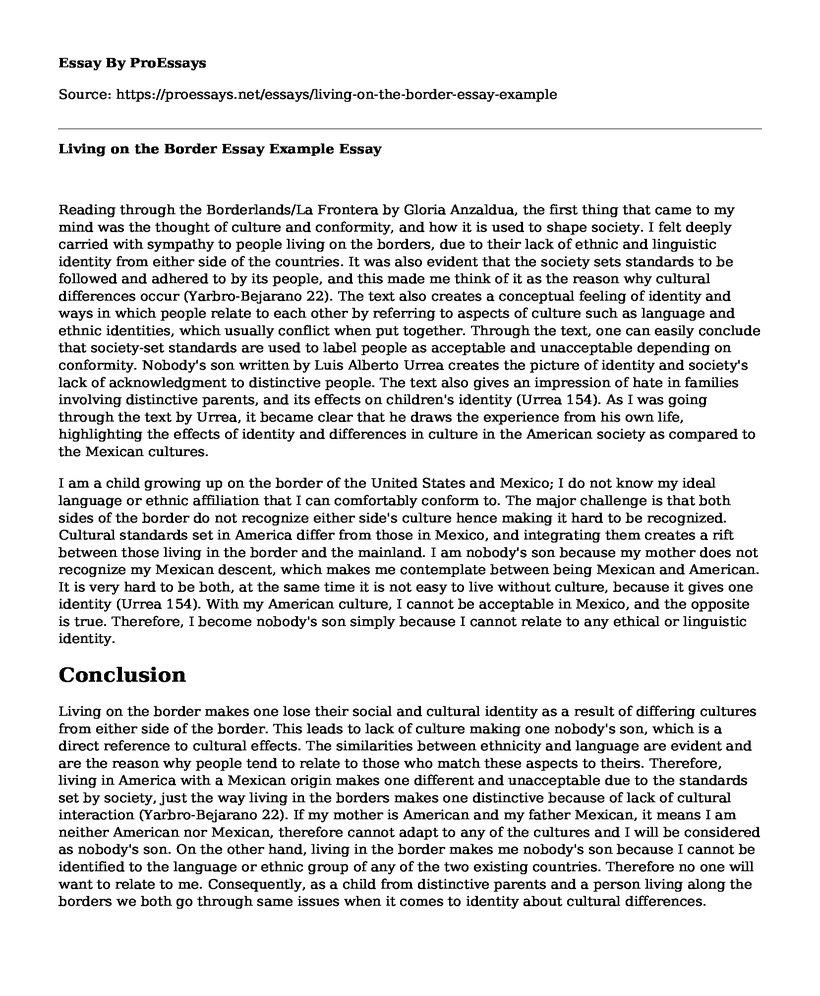Reading through the Borderlands/La Frontera by Gloria Anzaldua, the first thing that came to my mind was the thought of culture and conformity, and how it is used to shape society. I felt deeply carried with sympathy to people living on the borders, due to their lack of ethnic and linguistic identity from either side of the countries. It was also evident that the society sets standards to be followed and adhered to by its people, and this made me think of it as the reason why cultural differences occur (Yarbro-Bejarano 22). The text also creates a conceptual feeling of identity and ways in which people relate to each other by referring to aspects of culture such as language and ethnic identities, which usually conflict when put together. Through the text, one can easily conclude that society-set standards are used to label people as acceptable and unacceptable depending on conformity. Nobody's son written by Luis Alberto Urrea creates the picture of identity and society's lack of acknowledgment to distinctive people. The text also gives an impression of hate in families involving distinctive parents, and its effects on children's identity (Urrea 154). As I was going through the text by Urrea, it became clear that he draws the experience from his own life, highlighting the effects of identity and differences in culture in the American society as compared to the Mexican cultures.
I am a child growing up on the border of the United States and Mexico; I do not know my ideal language or ethnic affiliation that I can comfortably conform to. The major challenge is that both sides of the border do not recognize either side's culture hence making it hard to be recognized. Cultural standards set in America differ from those in Mexico, and integrating them creates a rift between those living in the border and the mainland. I am nobody's son because my mother does not recognize my Mexican descent, which makes me contemplate between being Mexican and American. It is very hard to be both, at the same time it is not easy to live without culture, because it gives one identity (Urrea 154). With my American culture, I cannot be acceptable in Mexico, and the opposite is true. Therefore, I become nobody's son simply because I cannot relate to any ethical or linguistic identity.
Conclusion
Living on the border makes one lose their social and cultural identity as a result of differing cultures from either side of the border. This leads to lack of culture making one nobody's son, which is a direct reference to cultural effects. The similarities between ethnicity and language are evident and are the reason why people tend to relate to those who match these aspects to theirs. Therefore, living in America with a Mexican origin makes one different and unacceptable due to the standards set by society, just the way living in the borders makes one distinctive because of lack of cultural interaction (Yarbro-Bejarano 22). If my mother is American and my father Mexican, it means I am neither American nor Mexican, therefore cannot adapt to any of the cultures and I will be considered as nobody's son. On the other hand, living in the border makes me nobody's son because I cannot be identified to the language or ethnic group of any of the two existing countries. Therefore no one will want to relate to me. Consequently, as a child from distinctive parents and a person living along the borders we both go through same issues when it comes to identity about cultural differences.
Works cited
Urrea, Luis Alberto. "Desolation Road." Ecotone 9.1 (2013): 152-159.
Yarbro-Bejarano, Yvonne. "Gloria Anzaldua's Borderlands/La Frontera: Cultural Studies,'Difference', and the Non-Unitary Subject." Contemporary American Women Writers. Routledge, 2017. 11-31.
Cite this page
Living on the Border Essay Example. (2022, May 26). Retrieved from https://proessays.net/essays/living-on-the-border-essay-example
If you are the original author of this essay and no longer wish to have it published on the ProEssays website, please click below to request its removal:
- Collections of the Palace Museum
- The Female Dwarf in the Walters Art Museum. Essay Sample.
- Summary Reaction to Brene's Talk on Connection Between Our Friends and Family
- The Impact of Family Structure and Change on Child Outcomes - Essay Sample
- Reflection Paper on Sweat Lodge by Bryan Little Chief
- Cross Categorization and Social Identity Management Paper Example
- Essay Example on Native Reaction to Invasion of America: 1892 vs 1992







